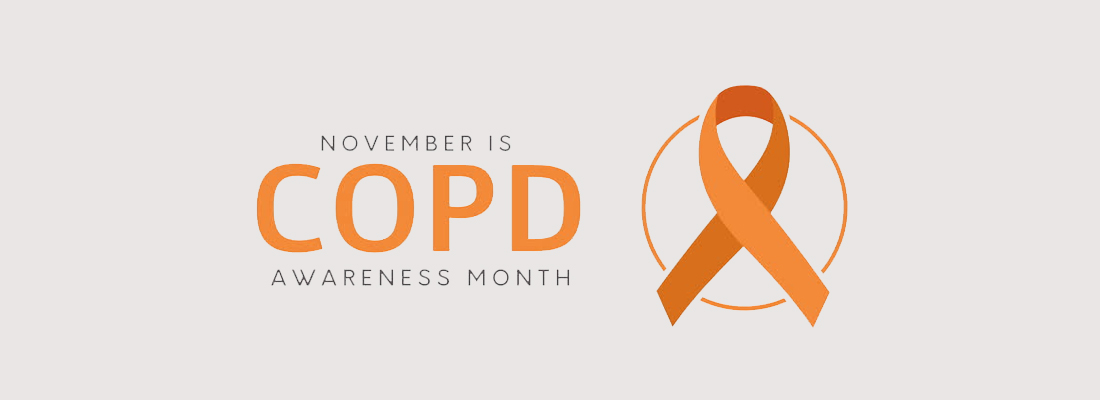Breathing is something most of us take for granted until it becomes hard to do. Millions of people around the world struggle with this every single day due to Chronic Obstructive Pulmonary Disease, or COPD. November is COPD Awareness Month 2025, a time to shine a light on lung health and encourage people to take breathlessness seriously.
According to the World Health Organization, COPD is now one of the leading causes of death worldwide. Yet, many people don’t even realize they have it until the disease has already caused lasting lung damage. Studies show that early diagnosis and treatment can slow down disease progression and improve quality of life. However, awareness remains low, and that’s where this month plays a key role.
What Is COPD?
COPD, short for Chronic Obstructive Pulmonary Disease, is a long-term lung condition that makes it hard to breathe. It includes two main conditions: emphysema and chronic bronchitis. Both cause inflammation and narrowing of the airways, which leads to shortness of breath, coughing, wheezing, and fatigue.
According to research, COPD affects more than 390 million people globally. Unfortunately, millions remain undiagnosed, often mistaking their symptoms for normal aging or smoking effects.
COPD is not curable, but it is manageable. With the right care, medications, inhalers, pulmonary rehab, and lifestyle changes, people can live longer, more active lives. That’s why National COPD Awareness Month 2025 focuses on education, early screening, and prevention.
World COPD Day 2025: “Short of Breath, Think COPD”
Every year, World COPD Day takes place on November 19th during COPD Awareness Month 2025. This year’s theme, “Short of Breath, Think COPD,” highlights one of the most common but often ignored warning signs of the disease, which is breathlessness.
The theme urges people not to dismiss shortness of breath as just part of aging, lack of fitness, or weather changes. Research shows that most people delay seeking help until their symptoms become severe, which makes treatment harder.
Doctors recommend speaking with a healthcare provider if you notice frequent coughing, chest tightness, or difficulty climbing stairs without gasping for air. Early diagnosis can make a world of difference.
Why Awareness Matters
Awareness can save lives. COPD Awareness Month 2025 is more than information; it’s about action. Studies suggest that raising awareness leads to more people getting tested, quitting smoking, and following treatment plans.
A report found that patients who participate in educational programs are more likely to manage their symptoms effectively and avoid hospitalization. This proves that awareness campaigns make a real difference.
However, awareness must start in communities. Encouraging conversations, sharing resources, and supporting loved ones who may be struggling to breathe can help catch COPD early before it’s too late.
Early Detection Saves Lives
One of the biggest challenges with COPD is that symptoms develop slowly. Many people lived with it for years before being diagnosed. Research shows that early diagnosis leads to better outcomes and fewer hospital visits. Common signs and symptoms of COPD include:
- Frequent coughing, with or without mucus
- Feeling short of breath, especially during physical activity
- Wheezing or whistling sounds while breathing
- Chest tightness or pressure
- Feeling tired or lacking energy most of the time
- Needing to catch your breath even after simple tasks
- Repeated lung infections like bronchitis
- Unexplained weight loss in later stages
Although COPD cannot be cured, catching it early gives patients a head starts in managing symptoms, improving fitness, and slowing lung damage.
Managing COPD: Steps Toward Better Breathing
Once diagnosed, managing COPD involves a mix of medical treatment and healthy habits include:
| Step | What It Means | How It Helps |
|---|---|---|
| Quit Smoking | The single most effective step to slow COPD progression. | Improves lung function and reduces flare-ups. |
| Use Inhalers Correctly | Inhalers help open airways and make breathing easier. | Reduces breathlessness and daily discomfort. |
| Join Pulmonary Rehab | A program that includes exercise, breathing techniques, and education. | Boosts stamina, strengthens lungs, and improves energy levels. |
| Stay Active | Gentle activities like walking, stretching, or yoga. | Keeps lungs strong and helps manage stress. |
| Eat Balanced Meals | Focus on lean protein, fruits, and vegetables. | Supports immune health and maintains body strength. |
| Avoid Triggers | Stay away from smoke, strong perfumes, and air pollution. | Reduces coughing and flare-ups caused by irritants. |
| Take Medications as Prescribed | Follow your doctor’s instructions for inhalers or oral medications. | Keeps symptoms stable and prevents hospital visits. |
| Get Vaccinated | Annual flu and pneumonia shots are key. | Protects against infections that worsen COPD. |
| Use Digital Tools | Track symptoms or reminders via phone apps or smart inhalers. | Helps you monitor progress and stay consistent. |
| Seek Support | Join support groups or talk to your doctor regularly. | Builds confidence and reduces anxiety about living with COPD. |
Raising COPD Awareness in Your Community
COPD doesn’t just affect those diagnosed. In addition, it affects families and communities. With this National COPD Awareness Month 2025, you can make a difference by spreading the word. Encourage local events, social media campaigns, and lung health screenings.
Even small actions, like sharing a post or checking in on someone with COPD, can help create a ripple effect. Healthcare organizations often host free spirometry testing or educational webinars during the month. Taking part in these events helps spread the message that breathlessness is not normal, but it’s a sign to act.
In 2025, the focus is on starting these conversations early and often. Because when more people recognize the symptoms, more lives can be saved.
Research and the Road Ahead
New research is offering hope for people living with COPD. Scientists are studying genetic risk factors, personalized inhaler therapies, and even stem cell treatments aimed at repairing damaged lung tissue.
That’s why awareness months like this one matter. They drive research funding, public education, and early intervention. Every bit of awareness brings us closer to better lung health for everyone.
Conclusion
In the end, COPD Awareness Month 2025 is about hope, knowledge, and action. It reminds us that even small steps like getting screened, quitting smoking, or supporting someone with COPD can make a big impact.
Breathing is life. This November, let’s take a moment to appreciate it, protect it, and help others do the same. If you’re short of breath, think COPD. Get tested. Get treated. And most importantly, keep breathing better, for longer.




